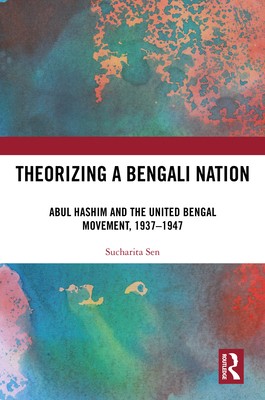
- We will send in 10–14 business days.
- Author: Sucharita Sen
- Publisher: Routledge Chapman & Hall
- ISBN-10: 1032233796
- ISBN-13: 9781032233796
- Format: 15.6 x 23.4 x 1.1 cm, hardcover
- Language: English
- SAVE -10% with code: EXTRA
Reviews
Description
This book explores the philosophical and political roots of the United Bengal movement of 1947 that emerged as a final bid to keep the province united against Partition. Through Abul Hashim, one of its architects, it explores the idea of an independent Bengali nation in the years preceding Independence and examines the underlying tensions of the concept of a Muslim-led independent Bangalistaan and its repercussions on a sizeable Hindu minority. Focusing on Hashim's writings and political contributions, the monograph highlights his vision of an aesthetic identity rooted within religious principles as well as civic ideals in a new united Bengal, where common law underwritten through religious ideals did not need to be necessarily opposed to western discourses of a modern state.
A major, new intervention, this book will be of great interest to scholars and researchers of modern Indian history, especially the Partition, politics and South Asian studies.
EXTRA 10 % discount with code: EXTRA
The promotion ends in 20d.18:54:55
The discount code is valid when purchasing from 10 €. Discounts do not stack.
- Author: Sucharita Sen
- Publisher: Routledge Chapman & Hall
- ISBN-10: 1032233796
- ISBN-13: 9781032233796
- Format: 15.6 x 23.4 x 1.1 cm, hardcover
- Language: English English
This book explores the philosophical and political roots of the United Bengal movement of 1947 that emerged as a final bid to keep the province united against Partition. Through Abul Hashim, one of its architects, it explores the idea of an independent Bengali nation in the years preceding Independence and examines the underlying tensions of the concept of a Muslim-led independent Bangalistaan and its repercussions on a sizeable Hindu minority. Focusing on Hashim's writings and political contributions, the monograph highlights his vision of an aesthetic identity rooted within religious principles as well as civic ideals in a new united Bengal, where common law underwritten through religious ideals did not need to be necessarily opposed to western discourses of a modern state.
A major, new intervention, this book will be of great interest to scholars and researchers of modern Indian history, especially the Partition, politics and South Asian studies.


Reviews